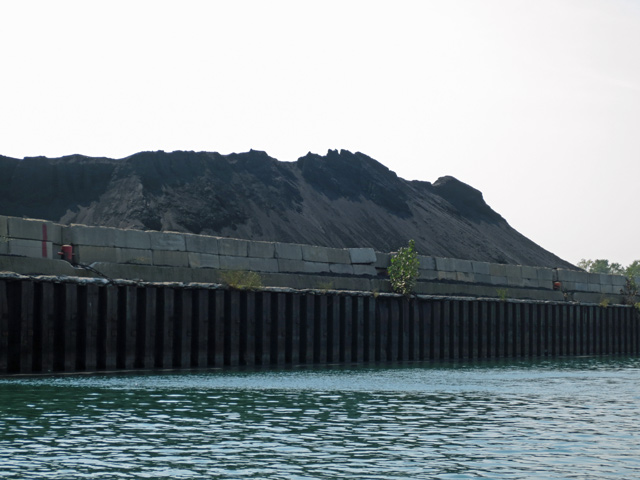Environmental Group: Gov. Quinn's Petcoke Restrictions Aren't Strong Enough
By Chuck Sudo in News on Jan 18, 2014 4:00PM

Petcoke piles on the banks of the Calumet River.
Following a proposal earlier in the week by Gov. Pat Quinn, Illinois Environmental Protection Agency Director Lisa Bonnett filed emergency rules with the Illinois Pollution Control Board Thursday to tighten how petroleum coke piles are stored and handled across the state. The filing, which was in reaction to multiple news reports of petcoke piles sitting open on the banks of the Calumet River on the city's Southeast Side, mostly doubles down on rules proposed by Mayor Rahm Emanuel.
• Within five days, a facility must install equipment to monitor wind speed.
• Within 30 days, a facility must install dust suppression systems along conveyor systems and any piles that are not totally enclosed.
• Within 45 days, a facility must submit applications for necessary permits and implement comprehensive wastewater and stormwater runoff controls that ensure that runoff that has come into contact with the piles is prevented from entering the waters of the state.
• Within 45 days, a facility must submit a plan to the IEPA for total enclosure of all coke and coal piles, transfer points, loading and unloading areas, screening areas, crushing and sizing areas to be completed as quickly as possible but no later than two years after these rules are adopted. Enclosure structures must be equipped with air pollution systems at all vents and entrances and exits for material and vehicles as well as an impermeable base to guard against ground seepage.
• Within 45 days, a facility must submit a plan to the IEPA to minimize the impact of truck traffic on residential areas near the source. All petcoke loading and transport must be done in vehicles sufficiently covered to guard against fugitive dust emissions.
• Within 45 days, a facility must submit a plan to the IEPA for coke and coal fugitive dust that must adhere to requirements in the Illinois Environmental Protection Act and must be updated at least semi-annually or within 30 days of a major equipment or control change.
• Within 60 days, a facility must remove all petcoke and coal that has been at the source for more than one year.
• Within 60 days, a facility must locate any piles, loading operations, transfer or emission points that are not totally enclosed to at least 200 feet inside the property line of the source, a minimum of 200 feet from all waters of the United States, all public water supply reservoirs and intakes and all potable wells and onto impenetrable bases or pads.
• Within 60 days, no pile may exceed 30 feet in height.
• Each calendar week, a facility must measure moisture content of representative samples and adjust dust suppression measures so as to meet certain standards and inspect all dust suppression equipment so as to ensure adequate operations.
• At least monthly, a facility must certify the operation of all dust suppression systems at all times during the processing of coal and coke and submit records to IEPA showing the types and quantities of materials delivered to and transported from the source, and data reflecting cleaning, street-sweeping and equipment maintenance frequency.
The rules will take effect as soon as the IPCB files them with the Illinois Secretary of State, which could happen as soon as the board's next meeting Jan. 23. Quinn said the emergency rules would benefit all Illinoisans. “No matter who you are or where you live, everyone has a right to a healthy environment."
Southeast side residents who live near the petcoke piles have worried for months about the longterm effects on their health from the dust being blown into the air from the piles. The Illinois Environmental Protection Agency has filed lawsuits against two of the companies tasked with managing the petcoke piles.
Watchdog groups like the Natural Resources Defense Council say the emergency rules are a good start but more vigilance is needed. The NRDC's Ann Alexander wrote the proposal "does not meet the Governor’s goal of a moratorium on new infusions of dirty petcoke into our communities."
"The state’s emergency rulemaking power was tailor made for bold action of that nature to protect the public. Both the Governor and Illinois EPA have made clear it is what they want. So there should be no obstacle to an additional emergency rulemaking, following today’s, making that happen."